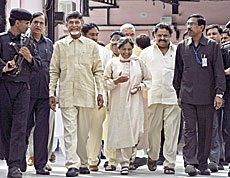NEW DELHI: Political wheeling dealing has reached a new height in the capital with key parties making all efforts to have their say on July 22, when the house will decide the fate of the United Progressive Alliance (UPA) government.
The future of the government and a controversial atomic energy deal with Washington hang in the balance this week with the coalition facing a confidence vote seen as being too close to call.
The Parliament opens debate tomorrow and is expected to decide on Tuesday whether the Congress party-led government, grappling for support after being ditched by its Communist allies, will stay in office.
If the government loses, Prime Minister Manmohan Singh will have to resign, and the world’s largest democracy will head into national elections — possibly as early as September or October.
It will also spell curtains for a deal with Washington designed to bring India out of decades of isolation and into the global nuclear energy marketplace.
The Congress says it will win despite the loss of left-wingers, but commentators are not so sure.
However, Congress spokesman M. Veeraapa Moily dismissed speculations about Singh’s resignation saying, “The question does not arise as he will win the trust vote comfortably.” Exuding confidence on the UPA gaining “support” from unexpected quarters, Moily said: “We know their (opposition’s) weaknesses. There are bound to be absentees especially from the Akali Dal and Shiv Sena.”
On a similar note, senior Congress leader Shivraj Singh Chauhan said: “Support from unexpected quarters may come in. Many surprising things will happen.” But commentators are not so sure. “Despite all the talk, the vote will be a close thing, as the smaller parties who hold the key may not back the prime minister,” prominent political analyst Mahesh Rangarajan said. “One should not be surprised if the government falls by a few votes.”
The coalition needs 272 votes to survive the July 22 ballot, and projections say it could fall about a dozen deputies short — despite bullish talk from several top Congress officials. With the left voting against, Congress has been courting the support of smaller regional and fence-sitting parties.
One week ago, Congress said it had won over the regional Samajwadi Party — which has 39 MPs — but some members of that party have threatened to rebel and side with the opposition Bharatiya Janata Party (BJP).
Munawar Hassan, a Samajwadi Party MP who had already joined Mayawati’s Bahujan Samaj Party (BSP), said in Lucknow that more MPs from the party are against the Indo-US civil nuclear deal and would be defying the party whip.
More shocking for the Samajwadi Party was the switching over of its general secretary Shahid Siddiqui.
The Rajya Sabha MP, who attended a breakfast meeting at Prime Minister Manmohan Singh’s residence in his role as editor of an Urdu daily, drove to Mayawati’s Delhi residence straight after that to declare his allegiance to the Uttar Pradesh chief minister.


